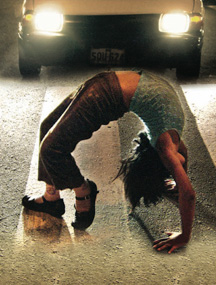Oblivion
El Olvido THE NETHERLANDS, GERMANY / 2008 / Spanish / Color / Video / 93 min
THE NETHERLANDS, GERMANY / 2008 / Spanish / Color / Video / 93 min
Director, Script: Heddy Honigmann
In collaboration with: Judith Vreriks, Sonia Goldenberg
Editing: Danniel Danniel, Jessica de Koning
Photography: Adri Schover, NSC
Sound: Piotr Van Dijk
Producer: Carmen Cobos
Production Company: Cobos Films BV
World Sales: Films Transit International Inc.
An old bartender, a waiter at a fancy restaurant, a leather worker, street urchins who perform acrobatics in traffic for small change in Lima, the capital of Peru. Interwoven with scenes of the inaugurations of Peru’s past presidents, the film is richly adorned with the stories these people tell and the things they produce: the bartender’s cocktails, the street performers’ props, the “frog juice” that enhances memory. Attentive to the things people forget in order to endure economic and political hardship, and the things that cannot be forgotten, this elaborately composed piece of poetry, Oblivion, brims with affection.
[Director’s Statement] If Lima, the capital of Peru, were to be covered in dust, the city would be invisible. It’s not, and yet hardly anybody ever notices it or gives its people, cheated and neglected by their rulers for centuries, any thought.
In Oblivion, Lima represents all other Latin American cities, whose seas or mountains are graveyards. Horror is omnipresent: in its streets, bars, hospitals, and neighborhoods. But the country isn’t “hot news.”
Reminiscence is a recurring theme in almost all of my films. With Oblivion, I wanted to create a poetic celebration of this forgotten city and its people.
A few years ago, a waiter at a fancy restaurant was the inspiration for the rediscovery of my city. He told me how he has survived the humiliation and hardship by smiling. Others manage to hold up their heads by silently making fun of the class that oppresses them. And some survive by entertaining car drivers with acrobatics, hoping for a few coins.
All my characters are first-class actors. Hardly any of them have ever been in a museum. Nor have they heard of Marcel Proust or Maria Callas; yet all the people you’ll meet in Oblivion are born poets.
Oblivion doesn’t scream at you, it whispers. Oblivion doesn’t sob; it just cries. Oblivion takes a flight over this forgotten city; like a bird it lands here, stops there, looks around, talks, listens, flies away again, and finally turns into a crystal ball that a young man keeps in perfect balance, thereby defying anonymity.
 Heddy Honigmann
Heddy Honigmann
Born in Lima, Peru in 1951, and trained as a filmmaker in Rome, Honigmann has lived and worked in the Netherlands since 1978. She isn’t particularly interested in railing against social inequities, despite the sense of political dissatisfaction one hears rumbling under her movies like a dyspeptic subway train. Her films (short and long fiction films, short and long documentaries) have traveled around the world, receiving major awards and retrospectives in Toronto, New York (the Museum of Modern Art), Paris, Berlin, Minneapolis, Barcelona, Madrid, Valencia, Ontario, Utrecht, Graz, Chicago, Berkeley and elsewhere. Metal and Melancholy (1993) received the Mayor’s Prize in the International Competition at YIDFF ’95. The Underground Orchestra (1998) received the Special Jury Prize at YIDFF ’99. Crazy (1999) screened at YIDFF 2001. |
